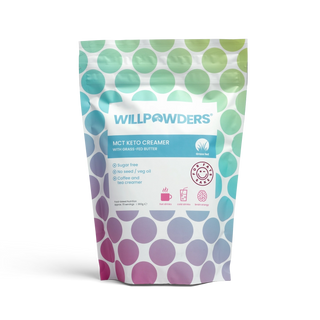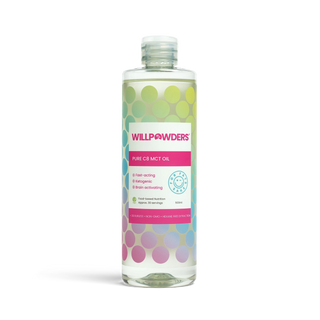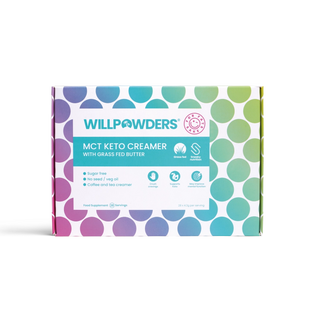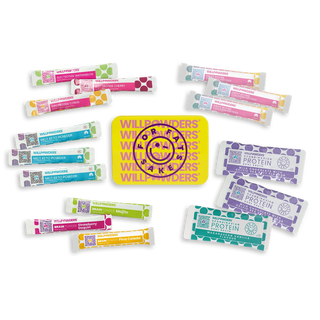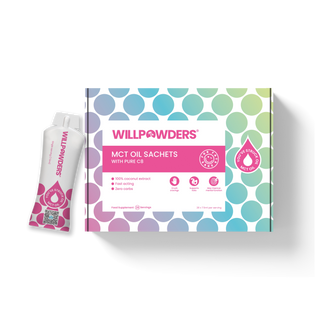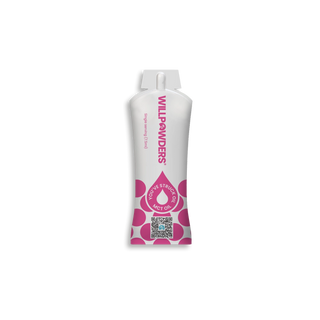MCT/ FAT BLOG
#FFS For Fat’s Sake
Join the Good Fat Club, You’ll Never Look Back!
At WillPowders, we do our due diligence, we read and research, we believe in nature and the ever evolving good science landscape that, if you look, is available. Fear not, we’ve looked for you!
We Research, We Research and We Research Some More...
Since the publication of Davinia Taylor’s Hack Your Hormones and It’s Not a Diet, which really isn’t that long ago, more and more evidence is pointing towards proving everything she says and believes is absolutely bob on, and everything we have been told by health care professionals, the Government and the occasional nutritionist is a crock.
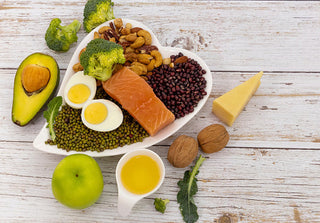
Introducing our Hero Doctors...
Malcolm Kendrick, Dr Ken Berry and Dr Cate Shananhan all share our incredulity and they too question conventional dietary advice, which they deem to be not based on solid scientific evidence and which has been spun into a big web of LIES. Berry and Shanahan, in particular, encourage us to question the low-fat, high-carb dietary recommendations. Instead, advocating for a low carb, high fat or ketogenic diet as a possible solution for improving health, particularly for those dealing with obesity, metabolic syndrome, and type 2 diabetes.
The Great Cholesterol Con
Malcolm Kendrick’s, The Great Cholesterol Con debunks the cholesterol controversy and suggests that the link between heart disease and what we eat has been massively exaggerated by Big Pharma. Why? So that they can flog their cholesterol lowering drugs. In fact, Big Bad Pharma has gone as far to downplay alternative approaches to heart health so that they can continue to line their pockets, rinsing us of our hard earned cash and worse, how we control our health.
Come Again, Doc?
Dr Ken Berry, who shares much of Kendrick’s scepticism, also questions the overprescription of medications and encourages patients to seek natural, non-pharmaceutical solutions whenever possible in his book, Lies Your Doctor Told Me. Furthermore, he encourages Doctor-Patient communication, suggesting that patients should feel empowered to ask questions and seek second opinions in order to avoid unnecessary medical tests and procedures, which can sometimes lead to overdiagnosis and overtreatment. Both men argue that health should not be solely defined by a number on a scale and that other health markers, such as blood pressure, blood sugar, and overall well-being, should be considered. The point being, we must seize a little control ourselves.
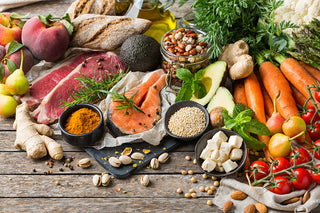
...and Again, Doc
The idea that there is no one size fits all approach to health is shared by Dr Cate Shanahan in her book, Deep Nutrition where she encourages readers to find a diet that works best for their individual needs and genetics.
A Deeper Look into Deeper Nutrition
Dr. Shanahan explores the connection between nutrition and health, highlighting the link between traditional diets and natural foods and low rates of chronic diseases. She highlights that a nutrient-dense diet that includes a variety of whole, unprocessed foods is key, emphasising the importance of consuming foods rich in vitamins, minerals, and antioxidants to support overall health, warning against the consumption of processed and refined foods, which often contain harmful additives, artificial sweeteners, and trans fats that can negatively impact health. This processed fare contains certain vegetable oils, particularly those high in polyunsaturated fats, such as soybean oil, corn oil, and canola oil, which Shananhan argues, can be detrimental to health due to their high omega-6 fatty acid content, which can contribute to inflammation and various health issues.
Whilst this may not seem overly groundbreaking, Shanahan highlights the significance of healthy fats, such as those found in avocados, nuts, and olive oil, for brain health, hormone balance, and overall well-being. She challenges the misconception that all fats are harmful and we love that! Why? Because the low fat craze has been detrimental to our mental health, it has ruined our gut microbiome, it has left us starving and made us put weight on.
For Fat's Sake #FFS, the Truth of the Matter is…
- Fat is a concentrated energy source, providing more than twice the energy per gram compared to carbohydrates and protein. When your body needs a sustained source of energy, it can utilise stored fat, FFS!
- Certain vitamins, like vitamins A, D, E, and K, are fat-soluble, meaning they require dietary fat for absorption. Consuming healthy fats helps your body absorb and utilise these vitamins effectively, FFS!
- Fats are a critical component of cell membranes. They help maintain cell integrity and function, ensuring proper communication between cells and the transport of substances in and out of cells, FFS!
- The brain is composed of approximately 60% fat, and it requires dietary fats for optimal function. Omega-3 fatty acids, in particular, found in fatty fish like salmon and walnuts, are known for their brain-boosting properties, FFS!
- Fats are essential for the production of hormones, including sex hormones (like oestrogen and testosterone) and various signalling molecules in the body, FFS!
The Doctor Said...
Much like Shanahan, Kendrick highlights that dietary cholesterol, found in foods like eggs and shellfish, does not have as significant an impact on blood cholesterol levels as once believed and that not all saturated fats are harmful. Instead, he shares Shanahan’s views, highlighting that eating a nutrition dense diet, focusing on whole foods, good fats, fruits, vegetables is needed, rather than obsessing solely over cholesterol levels.
Shanahan, Kendrick and Berry highlight that a more balanced approach to nutrition is needed and that conventional, old hat wisdom might need to evolve to secure physical, mental and emotional well-being. Fancy that! Let’s help spread this message, shall we, FFS!
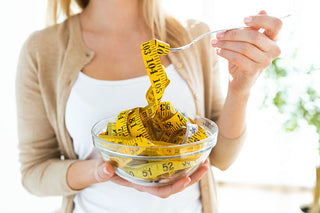
Eat the Smart way, FFS
Let’s get a few things straight: diets don’t work; fat is your friend and your fuel; eating as close to nature should be your only concern and counting chemicals not calories your only goal. If you opt for these mantras, you will live and feel better and your body will not fail you.
Fat is Fuel
In order to fuel your body in the most healthy way and as a symptom of these behaviours, to lose weight, you need to lose those panicky feelings around food and you need to let go of everything you have been told. The only way you can achieve this guilt free existence, this bliss point, is to understand that it’s definitely not about eating less and it’s most definitely not about eating ‘diet’ foods or low fat substitutes; it’s about eating a combination of good fats, foods rich in amino acids and food that is high in protein. It’s about learning what to avoid, what is going to make your cravings rage and what’s going to destroy your gut health.
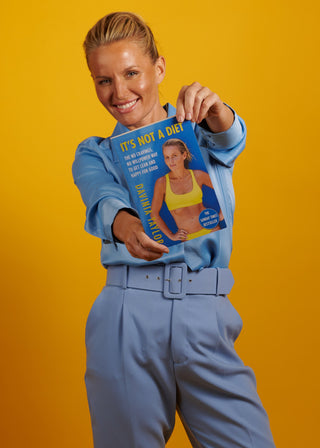
It’s not Fat that makes you Pile on the Pounds.
If you’re reading this, you will likely have engaged in a profusion of fad diets: diets that promised you would lose 14 stone in a day; diets that promised to restore your youthful glow and vigour; diets that celebs follow to get red carpet ready, meanwhile their private chefs are laughing their arses off at us mere mortals; diets that require you to only eat grapefruit, cabbage soup or the juice of vegetables; diets that are so utterly joyless that you spend most of the time sitting on your hands, stopping them from reaching for the biscuit tin; you dream about biscuits - biscuits are life, and before you know it, you’re eating biscuits and piling the pounds back on. It’s time to change that narrative, cut through the con and choose joyful food that is full of good fat and that is going to provide you with the satiety that you deserve.
The Truth
The reality of it is, when you crash diet, you store fat because your body panics and goes into survival mode - it’s an evolutionary thing. The minute you revert back to your normal eating habits, you quickly pile on the pounds because your body now believes that you are going to starve it again or fill it with harmful chemicals found in the so-called ‘diet’ foods that you have been surviving on. This in turn messes with your Leptin levels -the hormone that tells your brain that you are full - meaning that you will be more likely to overeat. When the crash diet ends, you feel hungry all the time and you’re back to square one.
We have been indoctrinated to believe that fat makes us fat, that it will give us heart disease and high cholesterol and persuaded to swap out natural fat for low fat substitutes made with inflammatory refined oils which are full of sugar. This results in a suffering gut that cannot function and do the brilliant things it does for our whole selves, hormone imbalances and an endless search for satiety and subliminal snack seeking.
As a first step on your road to recovery, it’s important that you know what to look out for and what to avoid. By counting chemicals rather than agonising over how many calories there are, you will be taking the best care of your body. As a rule of thumb, put down any package that lists ingredients that don’t sound like food. If you don’t recognise it, it shouldn’t be going in your mouth, e.g. gums, veg oils, dextrose (any ingredient that ends in ‘ose’ is usually sugar’), emulsifiers…

Oh, Nature - You Beauty!
A way to do this, is to do it the Paleo way. A Paleo diet is essentially eating anything that ran, flew, swam or grew; it’s about eating as close to nature as possible, eating ingredients that haven’t been faffed with or added to.
Now we are not here to preach or wax lyrical, but...
Eating organic produce is important if you want to be sure that your veggies and meat are as pure as can be. Whilst organic can be expensive, you can be sure to avoid the factory farmed meat produce that is pumped with hormones or the veggies that are sprayed with toxic chemicals. In the long run, eating organic will ensure that you hit your nutritional goals much quicker because you won’t be on that constant hunt for satisfaction, ultimately saving you money. You will also be able to sleep at night knowing that you’ve done your bit for the planet.
If you don’t opt for organic, make sure you wash your veggies in baking soda and apple cider vinegar to remove the pesticides. Stay away from the fat in non organic meat as this is where the residue of the omega 6 will linger and where it has been pumped full of antibiotics and toxins. This can play havoc with your own hormone balance and gut health.
To ensure that what you’re eating has been treated well and not kept in hideous, cramped conditions, look out for the following badges on meat packages: The Soil Association, The Organic Association or EU Organic. We would always suggest that you only eat ‘outdoor reared’ produce, not only for your peace of mind but also to keep your gut happy.
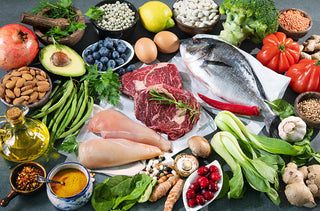
Top Tips:
- Only eat sausages that are 85% pork that has been ‘outdoor reared.’
- Avoid eggs that are not free range and organic. Just free range doesn’t necessarily mean they are living their best life.
- Corn fed chicken has been sold to us as healthy but the corn is likely to be genetically modified. Chickens should be eating worms not corn - they are not vegetarian, nor should they be yellow.
- Farmed fish is bad for the environment and their cramped conditions means they are more susceptible to infections and antibiotic intervention; therefore, stick to fish caught in the Atlantic, avoiding farmed fish from Vietnam and the Philippines where they use bucket loads of antibiotics.
- Prawns from the Far East are farmed in boxes and pumped full of antibiotics so stay as local as possible.
- Be warned, some Paleo packaged food will still contain sunflower oil, so always read the label.
- By buying your meat online, you cut out the middleman as it comes straight from the farm and the likelihood is, it will be cheaper. You can find some great suppliers at the back of It’s Not a Diet
- Offal is so nutrient dense and cheap. If you're squeamish about chomping down on some liver or kidneys, whip up a pate and reap the benefits by whacking it on a sourdough cracker. Yum!
What is the Problem with Veg Oil?
We have been conned into paying a premium to become overweight as most food in a packet contains fake fats! When you begin to understand that Big Food does not care about your waistline and health and only cares about lining their pockets with your money, you will be encouraged to get back to basics and improve your overall health and well-being. Let your fridge in on a bit of boycotting because when you eat food that is good for you, you will find satiety and you will be less likely to overeat. Once this happens a little bit of magic does too because your body will start telling you that it no longer wants ultra processed fare, low fat substitutes included, that simply spike your insulin and make you hungry.
If you are buying dinner in a packet, you need to look out for these inflammatory oils, aka, bad fats:
- Sunflower oil - the absolute Devil, used to clean farmyard machinery, highly inflammatory and processed, worse for your body than sugar
- Vegetable oil
- Rapeseed oil
- Soybean oil
- Canola oil
- Corn oil
- Safflower oil
- Sesame oil that isn’t cold pressed
- Peanut oil
- Palm kernel oil
- Vegetable oil spreads
- Cottonseed oil
- Margarine
- Vegetable shortening
- Partially hydrogenated or hydrogenated oil
- High stearic or stearic rich fat.
These oils cause inflammation, which in turn causes disease. If you take note of how these oils make you feel, you will likely be given the incentive to steer clear. If you feel rubbish, the likelihood is, it’s inflaming you.
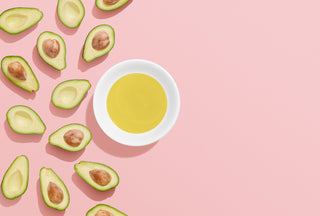
However, do not fear these ‘good’ fats that will easily turn into energy and will not inflame your body:
- Grass fed butter
- Ghee
- Duck and goose fat
- Chicken fat
- Pork lard
- Beef tallow
- Sustainably sourced red palm oil
- Coconut oil
- Avocado oil
- Olive oil
- Hazelnut oil
- Macadamia oil
- Almond oil
- Cold pressed and organic Sesame oil (small quantities for flavour)
- Walnut oil
- Rice bran oil
- Flaxseed oil
Big Food has spent the last couple of years framing processed food as good for you under the guise that it is plant based. Plants are good, yes? Yes, but in their natural form and not when they have been modified in a lab. If you’re vegetarian or vegan, it is so important that you stay as far away from these plant based claims as you can. Load your plate with avocados, pulses and organic veg to increase your B12, iron and vitamin A intake rather than consuming fake foods that are full of inflammatory oils and sugar that will only make you overeat and ruin your gut. Look out for fortified foods like cereals too as they are often synthetic and made with ingredients that block the liver.
Shelve the Food Panic: Fat is Fuel For Fats Sake and Protein Protects and Repairs
Fat makes you feel full and stops those pesky cravings. More than 60% of your brain is made of fat, so it makes sense that it’s what your body is telling you it wants and what it needs to function optimally. In addition, we need protein as it transports energy and oxygen around our body and repairs cells. Your body needs a certain amount of fat and protein every day, and research suggests that we simply keep eating until we give it what it requires. Eating well isn’t about eating like a rabbit, it’s about ensuring that your body is getting what it needs to prevent cravings and eating as close to nature as possible.
If you spend your day carbing out, you will crave more food because you haven’t reached your protein level. A lack of protein can lead to muscle weakness, a slow metabolism and even anaemia. Protein, like fat, helps you feel fuller for longer; your body has to use more calories to digest protein - so it not only burns fat, but supports your metabolism. Any meats, seafood, cheese, nuts, seeds and beans are great sources.
Feeding the brain with good fats is a detoxifier and a motivator. A Fatty Coffee is the best tool in your armoury to stave off the crave. It will keep you full, stop you from snacking and it will prevent the jitters. Your body is hardwired to use carbs as energy, meanwhile it stores the fat you consume. If fat is the first thing you consume, a switch will flick and your body will burn fat as your fuel instead. If you stay on the carb train, your blood sugar will constantly spike and you will spend your days trudging through a snackathon. However, if you become fat adapted, you will feel satisfied and be able to walk away from the biscuit tin with no regrets.
We have got you covered when you’re out and about: our MCT Powder sticks are the perfect travel companion to support those pesky cravings that are triggered the minute we walk out the door. We have dedicated a number of blogs to the power of MCT and How to WillPowder using MCT, which gives you all the information you need to become “fat adapted” and find your energy.
L-Theanine is a supplement that is the perfect fatty coffee partner as it inhibits the overstimulating effects of caffeine, aids sleep and reduces belly fat.
If coffee isn’t your bag, Matcha tea is a great alternative to add MCT Powder or Oil to. It’s an anti-inflammatory and great for autophagy as well.

Intermittent Fasting
Intermittent Fasting has so many health benefits. When you fast, or simply push your eating window back, you start to reap the benefits of autophagy. Autophagy is when your body starts to prioritise the removal of damaged cells, restoring your body’s balance - a clean up, if you will. After a few days, your eating body clock will kick in and you will fast with ease. Our How to Guides and dedicated blogs, including how to eat differently during your cycle will help you to get started.
Now we all know that during certain seasons or as our social calendar starts to ramp up, it’s much more difficult to feed our bodies with the good stuff and stay on track. Here are our top tips for eating out, or when you know you’re going to lose a bit of nutrient control…
- Before you get your “party” on, glug a small protein shake so you don’t attack the bread basket before you even begin.
- If inflammatory foods are going to be unavoidable, take a digestive enzyme before you eat to help your body process the junk.
- Don’t be afraid to ask the restaurant what’s in their food - if you know that dishes are made from scratch, you can always ask them to leave something out that you know is going to inflame you.
- Ask which of their produce are organic and free range and make a beeline for them.
- If none of their produce is organic and free range, order the leanest cut of meat so you can avoid those growth hormones and toxins that will be lurking in the fat.
- Take your own stevia for a sugar fix or your MCT powder for a coffee to avoid a caffeine spike and sugar cravings.
- Take your mood dairy and make a note of how what you ate made you feel, it might help you to remember what triggered you or made you feel rubbish.
- Take some activated charcoal afterwards. This will bind to the inflammatory foods and mitigate as much damage as possible.
For more top tips, check out our ‘How to Survive a Party Season’ blog.
In summary, fat is your friend, FFS. If you always have this at the back of your mind when you’re chowing down, you won’t go far wrong. To reap the benefits of the WillPowder’s way, join The Good Fat Club and stay abreast of the latest research and health products that will transform your health.
Disclaimer
Our blogs are written with love in the hope that they go some way in helping you feel like the rockstar you are, and whilst we do our due diligence, research like maniacs and fact check our stuff, we know everyone’s journey is different. They are intended to educate and empower you, not usurp medical advice. We would never advise you to stop, adjust, or modify any prescription medication without the direct supervision of your healthcare practitioner, but don’t be afraid to talk to your doctor about your new found knowledge, brought to you by the marvels of nature because they don't know everything! Blogs are always informed by Davinia but often written by a member of the team. Not all blogs reflect Davinia's experiences and sometimes provide alternative perspectives

